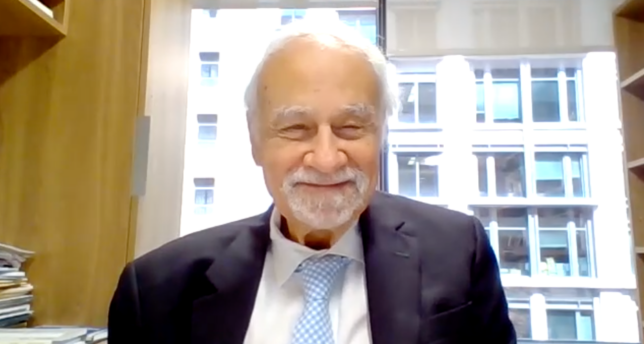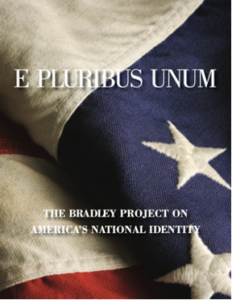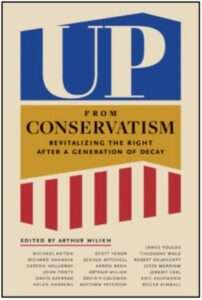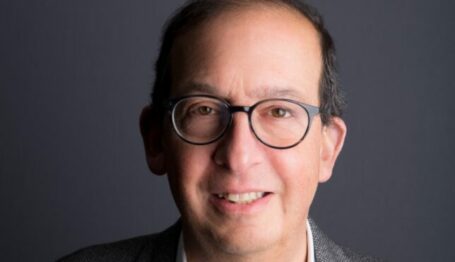Philanthropy
A Conversation with the Hudson Institute’s John Fonte (Part 2 of 2)
The historian, researcher, and teacher talks to Daniel P. Schmidt and Michael E. Hartmann about The Bradley Project on America’s National Identity in 2008, the risks of “conservative accommodationism”—including in philanthropy—and the need for conservatives to provide a genuine American narrative that stands as an alternative to progressivism’s false one.


We have known John Fonte for a long time, and respected his scholarship, analysis, and refreshingly straightforward way of framing and addressing issues for even longer. A senior fellow at the Hudson Institute and director of its Center for American Common Culture, Fonte researches and writes about history and civics education, citizenship and immigration, and international organizations, among other things.
He has been a visiting scholar at the American Enterprise Institute, where he directed the Committee to Review National Standards under the chairmanship of Lynne Cheney; a senior researcher at the U.S. Department of Education; program administrator at the National Endowment for the Humanities; and principal advisor for CIVITAS: A Framework for Civic Education, funded by the Pew Charitable Trusts.
Fonte was nominated by the President in 2018 and confirmed by the U.S. Senate in 2019 to serve on the National Council on the Humanities, which advises the chairman of the NEH. His term is now over.
Fonte worked very closely with us on The Bradley Project on America’s National Identity—the final report of which, E Pluribus Unum, was issued in 2008—and his Sovereignty or Submission: Will Americans Rule Themselves or Be Ruled by Others? was published by Encounter Books in 2011. Sovereignty or Submission won the Intercollegiate Studies Institute’s annual Conservative Book of the Year award in 2012, is being published in Sweden this year, and will soon be published in Hungarian.

In “Rediscovering a Genuine American Narrative”—his contribution to the new Up From Conservatism: Revitalizing the Right After a Generation of Decay, also from Encounter—Fonte writes that “the entirety of the American story or ‘narrative’ is interpreted for Americans by the progressive Left” and “is promoted by powerful forces through billions of dollars, physical intimidation, and moral blackmail.” It “seeks to delegitimize the Founders and therewith historical America,” he forthrightly notes. “This is a hill on which the American Right must fight.”
Fonte was kind enough to join us for a conversation last month. In the first part of our discussion, which is here, he talks about history and civics education, successful efforts to change the American narrative, and the risks of what he calls “conservative accommodationism” in the necessary attempt to rediscover a genuine one.
The edited, almost 18-and-a-half-minute video below is the conversation’s second part—during which Fonte talks about The Bradley Project in ’08, and what’s happened to America’s national identity since then. He also expands upon the risks of “conservative accommodationism”—including in philanthropy—and the need for conservatives to provide a counter-narrative to progressivism’s false one about America.
The Bradley Project’s 2008 E Pluribus Unum report now, according to Fonte, “was sort of way ahead of its time.” While he would add to its description of America as an idea—“we’re also a history, a people, a culture, a nation”—the Project “pretty much had it right.”
“[F]ive days before the election” in 2008, he recalls, “famous words were spoken by the man soon to be president United States, who said ‘We are five days away from the fundamental transformation of the United States of America.’ Fundamental transformation” is something progressive philanthropy “had been saying for 60, 70 years,” initially with an emphasis on economic matters.
Since 2020, “foundation after foundation, philanthropy after philanthropy, university after university, they’re all saying the same thing,” Fonte notes. They’re saying “America was wrong from the beginning.
“We’re in the middle of a revolution”—a political and cultural revolution that attacks “not simply our economy,” he says. “It’s politics, it’s culture, it’s our manners and mores, as Tocqueville would have said. It’s every aspect of American life ….
“At the time we wrote the Bradley report in ’08,” Fonte continues,
I don’t remember any discussion of ‘What is a man? Can you describe a woman?’ The liberals at the time would have been able to do to define a woman, I think. They wouldn’t have been able to say, ‘Well, I’m not a biologist. I can’t do that.’ …
We’re not simply in what’s called a culture war. We’re in a civilizational war. … It’s way beyond a question of ‘What bathroom do you use?’ … It’s very deep, and it’s civilizational, and it’s in a way Jacobin, like the French Revolution. We’re involved in a new French Revolution.
What’s conservatism to do? “As Burke reminded us, you can’t accommodate,” according to Fonte.
There’s not really any compromise with ‘What’s a man? What’s a woman?’ How do you compromise on ‘America is the land of systemic racism.’ … These are weaponized concepts that are not meant for compromise. They’re not stated in good faith. They’re not ‘Okay, we’re here. These are our views. What are your views?’ … These are bad-faith, weaponized concepts that are designed to deconstruct and delegitimize the American constitutional republic, and they have to be rejected, and we have to come up—instead of working with them on a compromise—we have to come up with an alternative.
As for philanthropy, it “is up to its neck in trying to delegitimize” America “and transform it and reconstruct it and change it. They want a new regime,” Fonte concludes. “As the leaders of the other French Revolution” said, “the goal of this” is
a new culture, a new history. They’ve come out with a new history in the last five years, the last 10 years … It’s a new country, that’s been redefined. It’s a new history, and the purpose of a new history is a new regime, in the Aristotelian and Platonic sense of a way of life, a new way of life, a new civilization. That is the end goal, that’s the telos of the progressive project. There cannot be a meeting of the minds, a common-ground consensus on this instrumentality, because there isn’t one.
This article originally appeared in the Giving Review on August 1, 2023.



